Rachel Neumeier's Blog, page 304
April 26, 2016
I really appreciate copy editors!
Nevertheless, this gif-filled post by Laura Anne Gilman is really funny.
Moments of copy editing she does not mention:
That moment when you are 75% of the way through copy edits and it suddenly occurs to you that really you need to change ONE THING that occurs OVER AND OVER in your manuscript and you have to go back to the beginning and look for THE THING all the way through.

Also, that moment when, in your head, you argue with the copy editor, and stet her change, and then decide fifty pages later that the copy editor was right after all, and you have to go looking for your Stet and erase it. And you can’t find it and start to wonder if you were dreaming about copy edits and never had that argument in your head with the copy editor in the first place.

Also! Just today I sent back the page proofs for MOUNTAIN, so I can mention another, much more positive Moment:
That moment when you see that your editor did in fact agree to go with your preferred spelling for a word rather than the obviously inferior spelling the copy editor chose.


April 25, 2016
Keeper of the Mist blog tour
Okay, I know I mentioned this before, like in February sometime, but for various reasons the blog tour had to be postponed. It is, however, starting today!
So, here, the updated schedule, which has just gone live.
The Fantastic Flying Book Club arranged this tour, so I’m grateful to Patricia Lopez & Anasheh Satoorian at The Unofficial Addiction Book Fan Club and at A Reading Nurse for setting this up. Thank you! I know it was a good bit of trouble what with one thing and another.
Twenty-four bloggers are participating over the next week or so, with every day bringing one interview or guest post plus several reviews. I’ll link to the interviews and guest posts, though I expect not to every. single. review. because I’m sure that would get old.
In case you are curious, though, even though I generally don’t comment about reviews here . . . I expect you mostly already know what you think about my books . . . a really positive review from a blogger does get:
a) deep writer appreciation and undying thanks (every review gets that),
b) mined for pithy quotes that look good on book jackets, and
c) a high probability that you’ll be offered an ARC of my next book, though I’m a bit shy of personally approaching bloggers for reviews unless I’m really pretty sure they will enjoy my next book.
So, the first interview just went live today.
Lots of the questions were tough! What’s your favorite book? Shoot, just one? That’s really hard. Who would you cast to play your main characters on the big screen? Good lord, I have no idea (frantically googles actors). I’m impressed to see that they went to the trouble of adding gifs and pictures!
Click through to read the whole (fairly long) interview.

Eavesdropping on the Arthur C Clark Award
This is funny: 17 things overheard during the judges’ deliberations for the Arthur C Clark Award
My favorite: “You know when you say ‘I’m not sure it’s science fiction?’ I’m not sure it’s a book.”
But there are a lot of contenders! If you have a minute, you should click through and read the whole list.

Writer’s whiplash
So, this weekend, I:
a) Wrote several guest posts for The Keeper of the Mist
b) Completed this draft of what we are tentatively calling The Dark Turn of Winter — it still needs work, which I will do this coming week as I read through it once more and cut the heck out of it. It grew in this draft and is now pretty long.
Also, it occurred to me this morning that I could switch one small scene to a different pov and that would probably work better. Things like that keep occurred to me. Even so, fundamentally this draft *is* finished. Call it the third rough draft. I know perfectly well my editor will want more stuff done to it once she (finally) reads it herself. By the time she sends it back, I should be able to have clearer view of it again.
Anyway, also:
c) Worked on page proofs for The Mountain of Kept Memory. To my moderate surprise, given a perfectly competent copy editor, I’ve caught five or so real typos plus a couple continuity errors. Honestly, I think typos really *do* breed in the manuscript when you aren’t looking. But most of the little changes I’m making are artistic adjustments. Adding a comma or taking out a few words or whatever. It’s such a pleasure to work with a truly finished draft, I must say. I’m really enjoying going through it. I will probably finish that tonight and then go back to (b) tomorrow.
I think this is the first time I’ve worked with three different books in one weekend. I actually did write half a guest post over the wrong book and have to throw it away and start over. So if you ever wondered whether that could happen: apparently yes it can. How embarrassing if I’d finished that post and sent it off.

April 23, 2016
Sometimes you wonder what they could have been thinking: Cover design
Okay, recently a few covers have caught my eye, not because they are necessarily BAD, but because I can’t read the title. Now, maybe it’s just me, but I would consider it a problem if you can’t read the title when you look at the cover of a book. I would especially consider that a problem if a significant number of potential readers are probably looking at tiny little thumbnail online.
So, first:
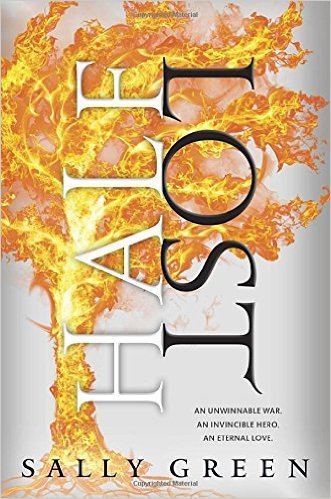
Quick, what is the title of that book?
LOST, right?
Did you actually see the “Half” right away? I didn’t. I was looking at a much smaller picture than this, in a row of little pictures of book covers.
Could you actually read the word “Half” right away? I couldn’t. I had to turn my head sideways and squint.
If the overall cover were darker . . . if the weird fiery tree were darker . . . if you saw the book full size and close up . . . then maybe. But I personally have trouble reading words that are printed sideways.
The titles of the other two books in the trilogy, Half Bad and Half Wild, are in the same style and equally difficult to read. As branding, the cover design is awesome. As readable covers, I think they’re . . . not quite ideal. But maybe that’s just me! What do you think? Thumbs up or thumbs down? Can you read the word “Half” easily, or does it not bother you even though you can’t?
Next:
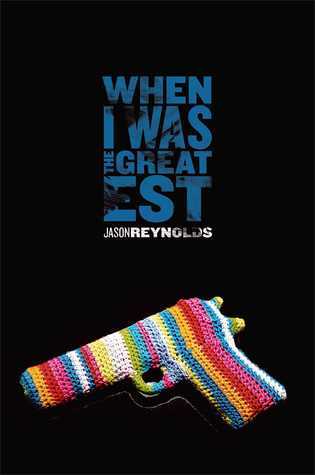
Quick, what does that say?
When . . . I . . . Was . . . um, what is that? oh . . . the Great . . . est.
I’m sorry, but that is ridiculously difficult. Is it supposed to be cute to cram all the words of the title together in this little box, even though you have to do this thing with great-est?
That weird potholder-covered gun doesn’t work for me, either. That’s a separate issue from an unreadable title, but I’m all, Wait, what? Is this a . . . cozy mystery? A murder mystery? Or wait! Could it be a gritty contemporary YA? Who would think of that, from this cover?
The title does sound like a YA, to me. “When I Was the Greatest,” sure, that sounds YA. Of course, it would be easier to tell that if I could read the title.
One more:
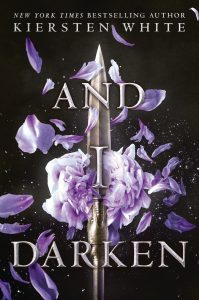
How about that? I like the title just fine: “And I Darken.” That’s good! Nothing wrong with the title!
But the “I” is hidden in the sword blade — so well hidden I actually missed it at first. I literally read this as “And … Darken.” That’s a terrible thing to do to a perfectly fine title.
Of course, maybe my eyes aren’t quite what they used to be. But I’m glad all my recent covers have featured type you can read, strongly contrasted with the background colors.

April 22, 2016
20 Beginnings
At the moment I have 20 samples in my “Sample” folder on my Kindle. They’re stacking up because I’m not reading much new fiction right now; because what I am reading is not samples I might or might not like, but stuff I have been anticipating and can’t bear to put off; and because I’ve finally more or less trained myself to get a sample of anything by a new-to-me author instead of risking buying the full book, most of the time. Well, some of the time. At least half of the time, probably.
Some of these samples have been on my Kindle more than a year (Owen; I’ll Meet You There), but a surprising number only made their appearance this week (Key, Egg; Beastkeeper; Spotless). I pick up most of them because of a recommendation from one or more of you all, some from recommendations from people I follow on Goodreads, and a few because a comment on Twitter caught my eye.
Of course you realize this is the other “Sample” folder, not the one with all the Beauty and the Beast retellings in it. And since I did a quick survey of the first lines of all those, it seems only fair to do the same with all these. Right?
Pretty soon I will need to go through both Sample folders and read everything and decide what to get rid of and what is promising enough that I should buy the full book, though by then I expect the number of samples will probably have doubled. (“Pretty soon” is defined in this context as sometime this year, or at least surely no later than next year.)
So, in alphabetical order
1. A Key, An Egg, An Unfortunate Remark (Connelly)
Evening had fallen on Seattle, and there were a great many people going somewhere they didn’t want to go. An ER nurse with an aching back, a recent graduate about to ask his father if he could move back in, a middle-aged woman facing another evening of her boyfriend’s tedious anime and even more tedious sex – all felt the helpless resignation that comes before an unpleasant, unavoidable task.
Of those thousands of people, none were expecting a warmer welcome than the man standing at Marley Jacob’s front gate, and none were more mistaken.
Not *so* intrigued. The comment that made me pick this up was one that compared this book to Tea With the Black Dragon by MacAvoy, but my instant response is that I am not thrilled with the woman with the boyfriend. Helpless resignation? For heaven’s sake, is she such a hopeless loser that she can’t dump the boyfriend if he’s not right for her?
Of course I would go on with this a bit and see what’s going on with the guy at Jacob’s front gate.
2. I’ll Meet You There (Demetrios)
The Mitchells’ backyard was packed, full of recent and not-so-recent grads in various stages of party decay. The girls leaned against one another, wilted flowers that looked on while the guys got louder, sweatier.
Not too catchy right off the bat. But I picked up the sample because of this review at Random Musings, so I expect I will actually love this book.
3. Court of Fives (Elliot)
We four sisters are sitting in the courtyard at dusk in what passes for peace in our house. Well-brought-up girls do not fidget nor fume nor ever betray the least impatience or boredom. But it is so hard to sit still when all I can think about is how I am going to sneak out of the house tomorrow to do the thing my father would never, ever give me permission for.
I like this.
4. Fire With Fire (Gannon)
The Taiwanese captain bowed quickly when his temporary commander – USSF Admiral Nolan Corcoran – rounded the corner. “Admiral Corcoran, I –”
Corcoran, a tall, broad-shouldered man whose sharp blue eyes and trim physique belied his advancing age, raised a silencing hand. He ignored the captain’s waiting covert ops team and moved instead to the cryogenic suspension unit resting on a gurney just behind them. “Is that the intruder?”
The description is pretty clichéd, but I must admit, I’m mildly intrigued by the intruder.
6. Beastkeeper (Hellisen)
The air was full of ice the night Sarah’s mother packed all her bags and walked out. That was the thing Sarah remembered most. How it was so cold that the weatherman had said it might snow. She lay awake, listening for snow hushing against the roof – and instead she heard her parents arguing.
I picked this up because a reviewer on Twitter said it was so atmospheric and moody and beautifully written. Despite this beginning, which could be contemporary, this is a fantasy. I couldn’t tell from the Twitter comment whether this has echoes of Beauty and the Beast, and I didn’t take a close look at the description before I picked up the sample.
7. A Business of Ferrets (Hilgartner)
The Yrkhaffe waterfront churned with activity. The Metara Kentis was in port. Even the stifling heat wasn’t enough to still the grunts and curses of the longshoremen as they unloaded barrels and crates: the fabled wine of Kalledann; wheat from Mebharev; and liquor from the shipmaster’s home port in Amarta.
Ferret watched the bustle with a shrewd and practiced eye.
I wasn’t too interested until we got to Ferret. I bet she’s a thief. I like thieves.
8. The Killing Kind (Holm)
The streets of downtown Miami shimmered in the evening heat, the summer air rich with spice and song. Neon and rum and the warm ocean breeze conspired to make the city thrum with lurid anticipation. It was, after all, a Friday night in one of the most vibrant cities in the world. Still, no one who walked that night beneath the broad modern portico of the Morales Incorporated Building suspected they’d briefly occupied the spot where a man was about to die.
I quite like this. Omniscient viewpoint isn’t my favorite thing, usually, but I’d certainly go on with this.
9. The Story of Owen, Dragon Slayer (Johnston)
Before the Thorskards came to Trondheim, we didn’t have a permanent dragon slayer. When a dragon attacked, you had to petition town hall (assuming it wasn’t on fire) and they would send to Toronto (assuming the phone lines weren’t on fire), and Queen’s Park would send out one of the government dragon slayers (assuming nothing on Toronto was on fire).
I love this! This is my favorite so far, by a mile. I’m almost sure it was once again Brandy at Random Musings who put this one on my radar ages ago. I bet I love it. I should probably just go on and pick up the actual book and not fool around with a sample, but on the other hand my TBR pile is a lot deeper than my Sample folder, so I may get to it faster if I just leave it here.
10. The Wolf’s Hour (McCammon)
The war went on.
By February 1941, it had leaped like a firestorm from Europe to the shores of northwest Africa, where Hitler’s commander of German troops, a competent officer named Erwin Rommel, arrived in Tripoli in support of the Italians and began to drive the British force back to the Nile.
I know this is a werewolf story during WWII. The werewolf is a good guy, a spy or agent or something. That’s what I remember from the description. Sounds like a set-up I would enjoy.
11. Spotless (Monk)
I could start by explaining why my parents called me Island, or the many reasons why being the daughter of a Frenchwoman and an American curmudgeon can traumatize a child for life . . . but I suspect no one really cares. So let’s start with the day my apartment got cleaned – I promise this is more interesting than it sounds.
Sherwood Smith reviewed this on Goodreads and it sounds like fun! This is a very promising beginning. I very much enjoy the last sentence of this snippet.
As a side note, how long do you suppose it will take me to adjust to a protagonist named Island? Frankly, I think that is a distracting, annoying name. Just as bad as Corporal Carrot and so on in the Diskworld books. Actually, it would bother me less if the protagonist were named after a particular island, like Madagascar or something. Well, I suppose I will be able to tolerate it if the book is good.
12. Clockwork Heart (Paglliassotti)
Taya cupped and fanned her wings, slowing as the iron struts of a wireferry tower loomed before her. The massive construction blocked the gusting winds, and she sighed with relief as her thick boot soles hit the girder. Bending her knees to absorb the impact, she crouched and folded her arms, ducking into the safe harbor.
Ooh, wings!
13. Act Like It (Parker)
Almost every night, between nine and ten past, Lainie Graham passionately kissed her ex-boyfriend. She was gruesomely dead by ten o’clock, stabbed through the neck by a jealous rival. If she was scheduled to perform in the weekend matinee, that was a minimum of six uncomfortable kisses a week. More, if the director called an extra rehearsal or the alternate actor was ill. Or if Will was being a prat backstage and she was slow to duck.
This is one I picked up because Chachic recommended it. A very enjoyable beginning. I love the first sentence and how it leads into this paragraph.
14. The Anvil of Ice (Rohan)
It was the chill before dawn that woke him, and the snuffling and stamping of the great bull in its stall. The dawns were always cold then, whatever the season, in the Long Winter of the Old World; in the dominion of the Ice. So the chronicles record, and though copied and recopied by many hands, the voice of one who has seen, and felt, speaks still from their pages.
I think I like this. I would certainly go on with it.
15. An Accidental Goddess (Sinclair)
It wasn’t the first time Gillie has hazily regained consciousness flat on her back in sick bay, feeling stiff and out of sorts. And unable to account for a missing two or three hours. Pub-crawling did have its side effects.
But it was the first time she’d been unable to account for a missing two or three hundred years.
16. Finders Keepers (Sinclair)
The Careless Venture’s intruder alarm erupted through the cavern with a harsh wail. Trilby Elliot shot to her feet, knocking over the makeshift repair table. Sonic welder and integrator cables clattered against the cavern floor.
You probably remember these came up during a recent-ish SFF romance post, right? Several of you recommended them. The first one has a more intriguing first few lines, but I thought both had good, enticing back cover copy and actually lean toward reading #16 before #15.
17. The Walls Around Us (Suma)
We went wild that hot night. We howled, we raged, we screamed. We were girls – some of us fourteen and fifteen; some sixteen, seventeen – but when the locks came undone, the doors of our cells gaping open and no one to shove us back in, we made the noise of savage animals, of men.
This is supposed to be very literary – I can’t remember if it’s supposed to be fantasy or contemporary. Certainly that’s a beginning that grabs your attention.
18. The Girls at the Kingfisher Club (Valentine)
By 1927 there were twelve girls who danced all night and never gave names, but by then the men had given up asking and called them all Princess.
I’ve heard tons about how wonderful this retelling of the Twelve Dancing Princesses is, particularly from Maureen at By Singing Light. I’m longing to read this.
19. The Just City (Walton)
She turned into a tree. It was a Mystery. It must have been. Nothing else made sense, because I didn’t understand it. I hate not understanding something. I put myself through all of this because I didn’t understand why she turned into a tree – why she chose to turn into a tree. Her name was Daphne, and so is the tree she became, my sacred laurel with which poets and victors crown themselves.
One gathers it’s Apollo speaking. Of course it’s Athene who sets up the Just City in this book, right? I know this is a very high concept kind of book and I want to read it, but I’m not sure I will really like it even if I appreciate it intellectually. Someday I will get to it and find out!
20. Nightside: The Long Sun (Gene Wolfe)
Enlightenment came to Patera Silk on the ball court; nothing could ever be the same after that. When he talked about it afterward, whispering to himself in the silent hours of the night as was his custom – and once when he told Maytera Marble, who was also Maytera Rose – he said it was as though someone who had always been behind him and standing (as it were) at both his shoulders had, after so many years of pregnant silence, begun to whisper into both his ears.
I tried The Book of the New Sun a long, long time ago. You know how I mention from time to time that I like a slow pace? Well, when I’d read about a zillion pages and Severian was still in the city, I gave up. I don’t know whether I was too young or whether it was really the book. Maybe both.
Also, torturer as protagonist, that’s a really tough sell for me. I will probably never touch a Joe Abercrombe book again ever in my life, but actually he did manage to make the character who was a torturer, Glokta, work for me. Glokta and his subplot were the only aspects of that trilogy I actually liked. And you’ll notice that despite being sort of sympathetic, Glokta was still actually almost completely evil.
Well, never mind, my point is, the idea for the Long Sun books works a whole lot better for me, and I think I really ought to try something else by Gene Wolfe, so…
And I have to say, I think this the above is a great beginning.
Now, I notice that there are a lot more beginnings here that really appeal to me than there were on the Beauty and the Beast list. That’s not surprising: those were all picked up because they were Beauty and the Beast retellings. Most of these were picked up because someone whose taste matches mine recommended them. So naturally I like a lot of them.
For me, going just by these snippets … of course I might read any of them first, it totally depends on my mood, but picking just for appealingness of the beginning …
#9, Owen, is a standout.
So is #11, Spotless. And #18, The Girls at the Kingfisher Club.
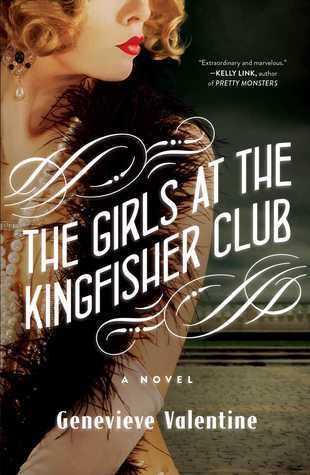
Those may be my top three out of these twenty. What do you all think?

April 21, 2016
Writing blind characters
Oh, hey, here’s a useful guest post at Terrible Minds, by Elsa S Henry, about writing characters who are blind or have limited vision.
So you were blinded by a tragic accident involving either fireworks or spilled chemicals?
For the last damn time, I am not Daredevil, okay. I’m blind because rubella in utero sucks and that caused me to end up blind (congenital cataracts), deaf and with a congenital heart defect. I’m not sure what the exact statistics are, but I know a lot more people who were born blind or went blind in childhood than who went through a tragic accident involving, I don’t know, 0464.
Lots of good points here, I think. I can offhand think of one blind character in SFF: Moira in Patricia Briggs’ UF series. This is kind of a funny example because Elsa Henry specifically has written about the blind-people-being-magic trope, aka Daredevil I presume, and here I go thinking of Moira, who of course IS magic.
Oh, Fawn’s grandmother is blind in Bujold’s Sharing Knife series, that’s another one. Of course she’s a minor character, but important to Fawn.
Honestly, I’m having trouble coming up with others.
A nonfiction title I’d read again if I were writing a blind character: The Mind’s Eye by Oliver Sacks. I had absolutely no idea how different the experience of blindness can be for different people until I read this book.

April 20, 2016
Secret lives, and also: outlines
An interesting post by Robert Browne at Killzoneblog: Faster than a Speeding Bullet, about writing romances.
You see, many of my writer friends are women. And many of those woman work in the world of romance, specifically the world of Harlequin romance. Some of them work for a line called Harlequin Intrigue, which is all about romantic suspense, and the emphasis on suspense over romance is completely up to the author.
When I asked my buddy Debra Webb (the Queen of Intrigue) if any men ever write for the line, she told me they did indeed and “Oh, my God, you should write for them! I’ll introduce you to my editor!”
The next thing I knew I was writing an outline and sample chapters and within a month I was working for Intrigue under a female pen name …
Now, I have certainly suspected that there must be a reasonable number of guys writing romances under female pen names, and that could spark a whole different discussion about reader expectations and prejudices and as far as that goes, I also wonder whether any women write Westerns or political thrillers under male names.
Actually, what I would most like to try is a massive experiment where ALL debut authors for the next decade or two go strictly by initials and last names and use their pets’ pictures as icons online and just see what that does to reader expectations and career outcomes for writers . . . well, I digress. The part of this post I actually wanted to point out is this bit:
Ever since I started writing, I’ve been a pantser. I come up with an idea, kinda sorta figure out who the main character is, then sit down and start writing. I had tried outlining many, many times (just like all the writing books say we should) and I just couldn’t stand to do them. My eyes would glaze over after three paragraphs. … But for the Harlequin Intrigue audition I had no choice but to write that outline and three sample chapters.
And so that’s what Browne did. Full outlines and suddenly he could write a book way faster than usual.
Contrast this with Hillerman from the post a couple days ago. He tried to write outlines and just couldn’t.
I feel there are probably three kinds of “pantsers” (I hate that term, please suggest something else?) in the world:
a) Like Tony Hillerman, the writer simply can’t write an outline that is coherent or goes anywhere.
b) Like Robert Browne, the writer can write an outline and finds it beneficial, but hates to do it.
c) Like me, the writer can produce (painfully) an outline that is sort of coherent, but finds it impossible to stick to the outline in practice. Attempts to do so result in EVEN MORE revision than usual, and believe me, I experience no lack of revision ordinarily. The outline actually slows down the production of a final draft because of having to periodically stop and figure out what’s not working and what to do instead of what the outline says.
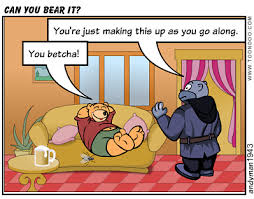

April 19, 2016
I always do read historicals as though they were fantasy —
But here is a post at Barnes and Noble focusing on a handful of historical titles that particularly seem like fantasy.
To me, historicals seem like fantasy-without-magic, and sometimes I read a historical without quite noticing it isn’t exactly fantasy.
I was paying attention in HILD, because so many people were talking about that for SFF awards the year it came out. Fabulous, fabulous book.
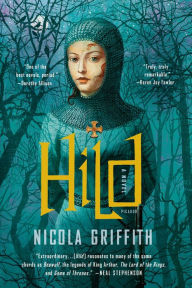
Not a bit of magic in it. Although the reading experience is so similar, I would never have nominated it for an SFF award because it definitely is not fantasy.
Contrast that with this description:
Few authors embody the relationship between historical fiction and fantasy better than Durham, whose work moves effortlessly between the genres. In The Risen, Durham skates as close to fantasy as possible without crossing the line, infusing the story of Spartacus’ slave rebellion with mystical priestesses who seem able to predict future events and a real sense from the various point-of-view characters that the gods they worship are very real, and actually do communicate with them, doling out assistance—or punishment. The strong characterizations make it easy to see how, in a world without formal education and not so separated from the more primitive and less civilized age that came before, a myriad of coincidental [events] could easily be seen as evidence of a magical world existing just under the surface.
I don’t know, I would probably read that as fantasy. If the pov characters believe the gods are real, and the gods kind of seem to be real enough to drive the plot, as a fantasy reader, I would take the gods to actually be real in this story. On the other hand, I would never read this particular novel. Unless it had a different ending. In which case, it would be set in a different world and at that point anybody would agree it was fantasy, I guess.
Another story that I think sounds very similar in its treatment of magical elements would be The King Must Die by Mary Renault. It’s got the same unquestioning assumption that the gods are real and influence the mortal world.
Also, I wonder how much of the decision about whether a book is historical or fantasy is based on the author’s name?
Soldier in the Mist? Obviously fantasy. Gene Wolfe wrote it.
Anyway, interesting list. I’ve never read any of these except HILD, but maybe I’ll take a look at the others . . . well, the ones that aren’t tragedies.

Where did Breq get that icon she was carrying, anyway?
Via File 770, here is a link to a short story that explains the icon that Breq was carrying with her in the Ancillary series. I admit I had to think about it to remember the icon at all. However, now that I’ve been reminded, yes, I did wonder about that.
This story apparent came out in Strange Horizons in 2014. Hmm. Well, better late hearing about these things than never, right?




